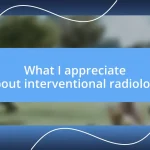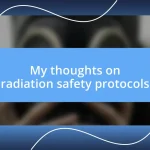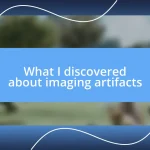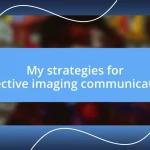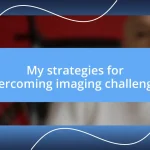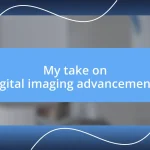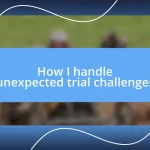Key takeaways:
- Passion is essential in drug development, providing motivation and fostering collaboration that leads to breakthroughs.
- Building a supportive network through industry events and mentorship can reignite enthusiasm and enhance professional growth.
- Setting achievable goals and engaging in continuous learning cultivate resilience, making challenges a source of innovation and shared growth.

Understanding the importance of passion
Passion is the fuel that drives innovation in drug development. I remember early in my career, feeling overwhelmed by the complexity of a challenging project. It was my passion that kept me up late, poring over research, driven by the belief that each step I took could lead to something life-changing for patients.
When I think about my work, I often ask myself: “What impact am I truly making?” This question ignites a fire within me. It’s not just about molecules and research papers; it’s about the lives we could touch. That emotional connection to our purpose often overshadows the inevitable challenges we encounter along the way.
In a field that constantly shifts and evolves, passion provides a sense of stability and direction. I find that when I am genuinely excited about a project, it’s contagious—it inspires my colleagues and creates a collaborative spirit. That enthusiasm transforms how we tackle problems, leading to unexpected breakthroughs that otherwise wouldn’t emerge in a more routine atmosphere.

Building a supportive network
Building a supportive network in drug development has been one of the most rewarding aspects of my career. One memorable experience was during a particularly tough phase of a project when I reached out to a colleague I hadn’t spoken to in years. Their fresh perspective not only renewed my enthusiasm but also helped me see solutions I hadn’t considered. This kind of connection is invaluable; it’s the interaction with others that often reignites our passion and propels our work forward.
To cultivate such a network, I’ve found the following strategies effective:
- Attend industry conferences: Engaging conversations at these events often spark new ideas and collaborations.
- Join professional organizations: Being part of a community with shared goals fosters a sense of belonging and support.
- Participate in mentorship programs: Both mentoring and being mentored can provide valuable insights and encouragement.
- Leverage social media: Platforms like LinkedIn can connect you with global experts and foster ongoing dialogue.
- Regularly check in with peers: Small gestures, like a coffee chat, can strengthen relationships and lead to invaluable exchanges of knowledge.
Building connections within the drug development community has not only enhanced my professional life but has also helped reinforce my passion for the work we do.

Setting achievable goals in research
Setting achievable goals is pivotal in research, especially in the intricate world of drug development. I recall a time when I aimed to complete a complex experiment within a tight time frame. Although ambitious, the goal was unrealistic, leading to frustration rather than progress. Adjusting my focus to smaller, actionable milestones not only alleviated that pressure but also resulted in cumulative successes that ultimately advanced my project.
One key takeaway from my experience is the importance of mapping out your journey. When I approach a project, I break it down into specific, measurable goals. For instance, instead of stating, “I want to develop a drug,” I say, “I want to identify potential candidates by the end of the month.” This clarity transforms daunting challenges into a series of manageable tasks, providing a sense of accomplishment with each milestone reached. Each small win fuels my motivation, driving me to keep moving forward.
By regularly revisiting and adjusting my objectives, I find that I’m better equipped to navigate the inherent uncertainties of research. It’s a reflective process that not only keeps my passion alive but ensures that the work I put in is both meaningful and impactful. Balancing ambition with pragmatism is key; it’s about setting the stage for success while maintaining the excitement that initially drew me to this field.
| Aspects | Achievable Goals | Unachievable Goals |
|---|---|---|
| Definition | Clear, specific, and attainable | Vague, overly ambitious, or unrealistic |
| Examples | Complete phase-1 testing within six months | Develop a new drug within a year |
| Impact on motivation | Boosts morale and fosters momentum | Leads to frustration and demotivation |
| Evaluation | Regularly assessed and adjusted | Rarely revisited or adjusted |

Engaging in continuous learning
Engaging in continuous learning is key to staying passionate in the drug development field. I often find myself reflecting on my journey, realizing that every moment spent learning something new adds a layer of excitement to my work. For instance, I remember enrolling in an online course about cutting-edge gene therapies, which opened my eyes to innovative possibilities I hadn’t previously considered. Could there be any better way to fuel inspiration than expanding my knowledge on the latest advancements?
I’ve made it a habit to set aside regular time for reading journals, attending webinars, or simply diving into podcasts from industry leaders. During one particularly becoming requirement, I listened to a series on drug repurposing strategies that sparked several ideas for my own projects. This habit not only feeds my curiosity but also positions me to contribute meaningfully to discussions, helping me feel more engaged and less stagnant in an ever-evolving field. What I’ve learned is that these little investments in learning can lead to breakthroughs that rejuvenate my passion.
Moreover, I thrive on sharing insights with my colleagues. After attending a workshop that focused on the practical application of artificial intelligence in drug discovery, I organized a casual lunch-and-learn session. The energy in the room was palpable as we brainstormed how to incorporate what we learned into our current projects. That experience taught me that learning doesn’t just enrich me; it creates a ripple effect, energizing the team and reigniting our collective enthusiasm. When we embrace learning together, it transforms our work into an adventure we all share.

Cultivating resilience through challenges
Cultivating resilience is often born from the challenges we face. I still remember a pivotal moment when a critical experiment failed spectacularly, leaving me feeling devastated. Instead of succumbing to frustration, I took a step back, analyzed what went wrong, and viewed it as a learning opportunity. Those setbacks taught me that resilience isn’t just about bouncing back—it’s about adapting my approach and finding innovative solutions to complex problems.
When confronting obstacles, I find it helpful to embrace a mindset of curiosity. For instance, I once struggled with a novel compound that had great potential but unpredictable results. By framing it as a puzzle to solve rather than an insurmountable barrier, I found joy in the process of experimentation. I thought, “What if this didn’t work because of X or Y?” This shift in perspective not only kept my passion ignited but also led me down unexpected paths that ultimately contributed to breakthroughs in my research.
Motivation through challenges doesn’t always come easily, but I’ve discovered that surrounding myself with a supportive network makes a world of difference. There have been times when my colleagues rallied around me, sharing their own experiences and stories of perseverance. Reflecting on those conversations, I started to appreciate that resilience isn’t just an individual journey. It thrives in a community where we uplift one another, turning setbacks into shared experiences that strengthen our resolve. Wouldn’t you agree that together, we can face any challenge head-on?
